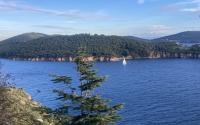25 September 2006PlanetarkTom Doggett
The US District Court of Alaska earlier this month blocked the department's plan to allow energy development on lands around Teshekpuk Lake in the National Petroleum Reserve, saying the government's assumptions about the environmental impact of drilling in the area were faulty.
The department told the court Thursday it would pull the wetlands in dispute so the matter could be studied further, but it asked for energy exploration to continue on the other lands in the planned lease sale Wednesday.
In its filing with the court, the department said, "The ability to go forward with some leasing in the (petroleum reserve) is in the public interest."
The department's Bureau of Land Management initially wanted to offer energy companies the opportunity to search for crude oil and natural gas on about 8 million acres in the petroleum reserve.
Environmentalists were concerned because 373,000 acres north of the reserve's Teshekpuk Lake were also being put up for lease for the first time.
The reserve is estimated to hold between 5.9 billion and 13.2 billion barrels of recoverable oil and 39 trillion to 83 trillion cubic feet of natural gas. Two billion barrels of oil may be around Teshekpuk Lake alone, the BLM said.
The reserve's energy supplies are needed and steps would be taken to limit the impact of drilling at the biologically sensitive areas near Teshekpuk Lake, the agency argued.
Drilling opponents countered the oil and gas were not worth possibly harming the wetlands habitat for the reserve's wildlife, some of which native Inupiat residents depend on for food, and the government did not properly analyze the environmental risks.
The court sided with the green groups on the BLM's original lease sale, but has not made a decision on the agency's revised plan.
The 23 million-acre National Petroleum Reserve, about the size of Indiana, was created in 1923 to provide energy supplies for the US military.
It is in the northwest corner of Alaska, near the Arctic National Wildlife Refuge that the Bush administration has eagerly sought to open to drilling. It has so far been unable to convince Congress to do so.






